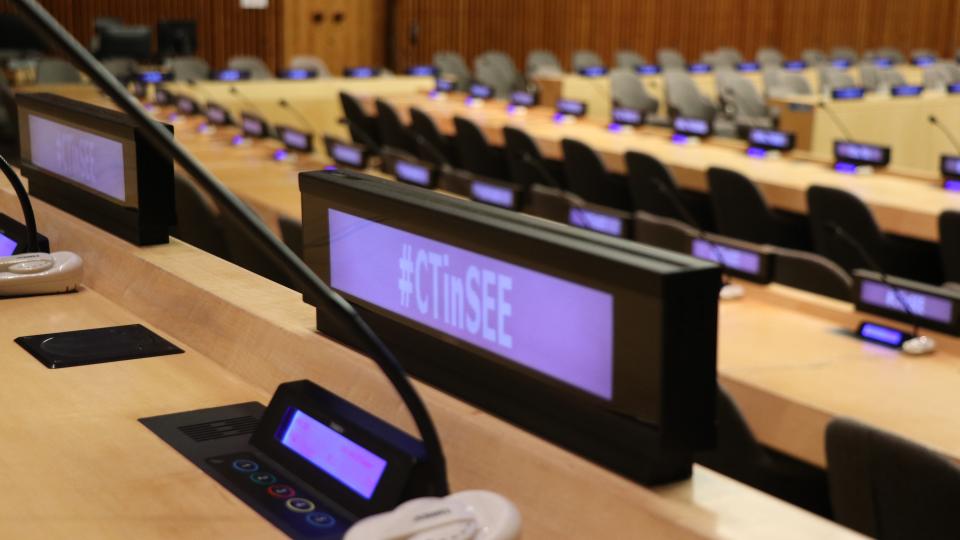
The Counter-Terrorism Committee of the United Nations Security Council convened a regional open briefing on counter-terrorism efforts in South-East Europe, providing an opportunity to take stock of the evolving nature of terrorism and hear from Member States as to how their approaches are changing. The briefing included participation from government representatives, regional organizations, academic experts, and civil society actors, both in-person and remotely, serving as a crucial platform for aligning counter-terrorism efforts among stakeholders in South-East Europe and beyond.
Mandated by resolution 2617 (2021), the Counter-Terrorism Committee Executive Directorate (CTED) is tasked with enhancing the sharing of country Assessment Visits’ findings with Member States and relevant partners, including through open briefings, marking the first of its kind for the Committee in South-East Europe.
“The Committee, supported by CTED, has a global mandate to monitor and assess the implementation of relevant Security Council resolutions on counter-terrorism, as no country or region is immune from the terrorist threat,” noted H.E. Amb. Amar Bendjama, Chair of the CTC.
While a recent Global Implementation Survey conducted by CTED highlighted that South-East Europe had experienced minimal terrorist activity in recent years compared to other parts of Europe, concerns remain. Transnational organized crime groups, including those involved in human trafficking and the smuggling of illicit goods, may have ties to terrorism. Additionally, the region has faced challenges related to incitement to violence based on various forms of intolerance.
The Analytical Support and Sanctions Monitoring Team pursuant to resolutions 1526 (2004) and 2253 (2015) have, in its reports, also underscored concerns about the Balkans serving as a potential route for terrorists to infiltrate European territories undetected. Moreover, the emergence of new routes utilized by Foreign Terrorist Fighters (FTFs) traveling from Southern Europe to the Sahel has raised alarms among Member States.
Addressing this, Amb. Bendjama noted that through assessment visits conducted by CTED in accordance with the CTC’s Visit Framework document, “the Committee is aware of several initiatives that the Governments of the subregion have implemented to respond to the threats posed by foreign terrorist fighters.” These measures, he stated, “include the work of risk assessment units of border police, the sharing of updated information with border control posts on methods used by such fighters and their travel patterns, and the provision of training to the border police.”
During the opening of the briefing, Assistant Secretary-General Ms. Natalia Gherman, Executive Director of CTED, highlighted the importance of the subregion continuing to enhance regional cooperation and exchange of information to mitigate the terrorism threat. “As we continue our collective efforts to address the threat posed by terrorism, it is essential to underscore the importance of human-rights compliant and gender-sensitive counter terrorism approaches,” she stated. “Multilateralism, information-sharing and cooperation across borders are also key to address the decentralized, transnational and multifaceted character of the terrorism threat.”
The open briefing also provided an opportunity to take stock of the evolving nature of terrorism and hear from Member States as to how their approaches are changing. “Terrorist groups continue to adapt, utilizing new technologies and tactics,” highlighted Mr. Vladimir Voronkov, Under-Secretary-General of the UN Office of Counter-Terrorism (UNOCT). “The proliferation of cyber capabilities and other new technologies, the spread of violent extremism online, and the potential for lone-actor attacks…pose significant threats.”
To address the identified challenges, Governments in the region have implemented various initiatives aimed at preventing the travel of Foreign Terrorist Fighters (FTFs), enhancing information sharing, and strengthening measures to counter terrorism financing. Efforts have also been underway to align with international standards, including those set by the Financial Action Task Force (FATF).
In preparation for the briefing, Member States were urged to review and update their national counter-terrorism strategies, ensuring they were in line with international legal frameworks, including human rights and humanitarian law. Moreover, the briefing aimed to facilitate collaboration between Member States, UN bodies, and international and regional organizations, as well as civil society actors.
In this vein, the briefing followed a CTED-led round-table event held in mid-2022, which engaged civil society representatives from South-East Europe. The focus of the event centred on the pivotal role of civil society in crafting and executing comprehensive counter-terrorism strategies, with CTED compiling a report outlining the insights and recommendations shared during the discussion.
This week’s briefing included participation from government representatives, regional organizations, academic experts, and civil society actors, both in-person and remotely. Structured into two segments, discussions revolved around the evolving terrorism threat in the region and the activities of international bodies in providing technical assistance to South-East European States.
The briefing served as a crucial platform for aligning counter-terrorism efforts, addressing emerging threats, and fostering cooperation among stakeholders in South-East Europe and beyond.
Additional resources:
Photos
Video
Statements
- Opening statement: H.E. Mr. Amar Bendjama, Chair, Counter-Terrorism Committee
- Opening statement: Ms. Natalia Gherman, Assistant Secretary-General and Executive Director, CTED
- Opening statement: Mr. Vladimir Voronkov, Under-Secretary-General, UN Office of Counter-Terrorism
- Closing statement: H.E. Mr. Amar Bendjama, Chair, Counter-Terrorism Committee
- Video statement: Parliamentary Assembly of the Mediterranean
- Statements by Member States are available upon request
Presentations

